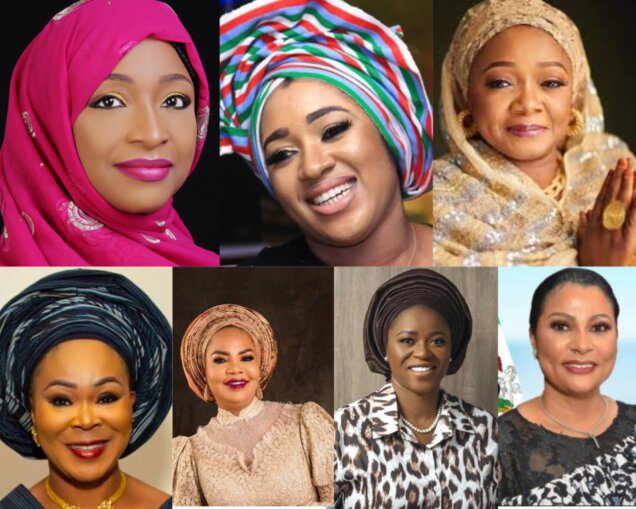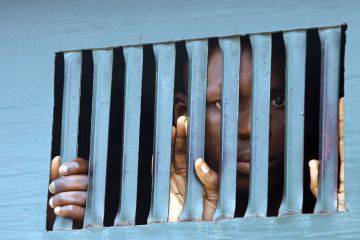Political Issues
Gender Parity In Nigerian Politics: Progress In Appointive Positions, But Still A Long Way To Go In Elective Positions -By Isaac Asabor
Article 2 of the Convention on the Elimination of All Forms of Discrimination against Women (CEDAW) warns against all forms of discrimination against women. In particular, Article 2 (d) advises people “To refrain from engaging in any act or practice of discrimination against women and to ensure that public authorities and institutions shall act in conformity with this obligation.”

It is no more news that the presidential and general elections conducted earlier in the year have gone with the characteristic display of patriarchal and domineering dispositions usually exhibited by misogynistic politicians toward their female colleagues so much that their collective retrogressive actions impede the elective opportunities of women politicians who ought to be brought together from across the divided political spectrum to ensure increased female representation.
Thus, there is no denying the fact that not a few individuals and groups have over the years been campaigning and calling for political reforms to ensure the effective participation of women in all positions of political leadership.
Without a doubt, the perennial neglect of women, particularly in elective positions has kept the tongues of many Nigerians wagging, as they usually ask, “Why are Nigerian women left out in the electoral scheme of things when it comes to elective opportunities?
In fact, in as much as Nigeria’s equity challenge stems from other deep-rooted issues, which are mirrored in many other African countries. Numerous social and cultural barriers stand in the way of women and girls’ economic, social, and political attainments, there is no denying the fact that partisan-minded male politicians have from one political dispensation to the other remain the major stumbling block to not a few female politicians in their bid hold elective positions across various electoral constituencies in Nigeria.
Against the backdrop of the foregoing, it is expedient to say that the discrimination against the woman by misogynists has seemingly remained irresolvable and pervasive that it is at the moment negatively reflecting on the proportion of women holding political offices across various tiers of government in our country. The comparatively number of women that are today holding various political offices were appointed, and not elected.
As gathered from spontaneous parleys, the reason why women hold positions of appointment more than elective positions cannot be far-fetched. Most women are seemingly afraid to vie for elective positions because as it were, they would not be voted for by all the misogynists among the electorate. Most women that are today in active politics literarily rode on the wings of their husbands, who are no doubt politically powerful or rode on the goodwill which their profession bestowed on them.
The most discouraging aspect of this topic is that if a woman is married to a man from a different state of origin, she would automatically find herself in a dilemma. She cannot easily declare her intention to run for any elective political position within the political constituencies of her husband as she would be rejected by her in-laws who are invariably misogynists who will unashamedly tell her to her face, “You are not our daughter, you just our wife, or “So you want to be bigger than your husband”, on the ground that she is not a direct indigene or “daughter of the soil”. On the other hand, her relations would also reject her from vying for any political office in her own fatherland for the mere fact that she is married to a non-indigene. What a dilemma!
The foregoing summarizes one of the biggest political encumbrances women are today facing in Nigeria’s political landscape. In my view, I suggest this issue should be legislatively and constitutionally addressed to protect women from being marginalized in this democratic dispensation.
Without resorting to playing Oliver Twist in this context on behalf of Nigerian women, these issues are compounded by the inaction of current political leadership. Only a few days ago, seven women were nominated for ministerial positions in the ongoing democratic dispensation. The women consist of 25% of the nominees while 75% are men. The women are Betta Edu, Doris Aniche Uzoka, Hannatu Musawa, Nkiru Onyeojiocha, Stella Okotete, Nkiru Onyeojiocha, Uju Kennedy Ohaneye, and Iman Suleiman Ibrahim. As gathered today, some of those that appeared before the Senate as at the time of writing this piece were cleared by the lawmakers.
At this juncture, it will be recalled that the Gender and Equal Opportunity Bill has for the umpteenth time since Nigeria embraced democratic government suffered setbacks at the Senate. To say that the bills were aimed at opening the door of opportunities for increased representation of women in politics, including legislation mandating that women fill 35% of appointed positions in government and 35% of elective positions, is, to say the obvious.
Given the foregoing, it is expedient to ask, “Why are political parties not reviewing their manifestos, constitution, and practices to accommodate more women in elective positions? The foregoing question cannot be pooh-poohed by a mere wave of the hand as gender parity in Nigerian politics persists as women have only been recording progress in appointive positions, without making the same progress in elective positions.
The reason for the foregoing view cannot be farfetched as the United Nations (UN) has a resolution that says the critical focus of democracy is to promote human rights as well as ensure that both men and women are treated equally based on their fundamental human rights, have equal access to opportunities, and have the choice to participate in the electoral process and be able to vote and be voted for. According to UNESCO, “Democracy is the ability of people to freely make political choices to choose their leaders, government, and policies”.
Opinionating from the perspective of the foregoing facts, it is germane to say that Men and Women have equal rights to participate actively in politics. The law provides women’s inclusion and participation in politics, especially in a democratic setting. According to Article 21 of the Universal Human Rights, Women have every right to always fully participate in elections. In my view, it is expedient to open the window of opportunities for women in elective politics. In fact, according to the supranational body’s Declaration of Human Rights, “Everyone has the right to participate in the government of his country, directly or through freely chosen representatives.”
Elsewhere, Article 2 of the Convention on the Elimination of All Forms of Discrimination against Women (CEDAW) warns against all forms of discrimination against women. In particular, Article 2 (d) advises people “To refrain from engaging in any act or practice of discrimination against women and to ensure that public authorities and institutions shall act in conformity with this obligation.”
Furthermore, Article 2 of the ‘Protocol To The African Charter On Human And Peoples’ Rights On The Rights Of Women In Africa still dwelt on the Elimination of Discrimination Against Women. Article 9 provides the “Right to Participation in the Political and Decision-Making Process.”
In fact, it is painful that Nigeria’s male political elite are not from the prism of democratic practice focusing on gender inclusivity, considering the fact that women are also key players in Nigerian politics as they have almost equaled the population figure of their male counterparts. For the umpteenth time, global policymakers and governments have had an “Increased focus on the need for women’s participation in political processes and on their contributions to building stronger societies.” Without sounding exaggerative in this context, women’s participation in leadership and governance is key to nation-building because women are game changers and agents of change.
Reiteratively viewed, men and women have equal rights to participate actively in politics. The law provides women’s inclusion and participation in politics, especially in a democratic setting. According to Article 21 of the Universal Declaration of Human Rights, “Everyone has the right to participate in the government of his country, directly or through freely chosen representatives.” In fact, in three concise paragraphs, the article outlines some of the fundamental principles of democracy: The will of the people should be the basis of government authority, and everyone has the right to take part in the government “directly or through freely chosen representatives.”
In fact, taking this argument further, it is expedient to buttress the facts that collectively surmised this piece by statistically saying that the total population of Nigeria by gender in 2021, has it that Nigeria’s female population is approximately 105.57 million, while the male population amounted to approximately 107.83 million. To me, the huge population of women which is not widely less than that of men gives credence for anyone to argue that both genders should be given enormous opportunities to be participating in elective politics from one political dispensation to another.



















